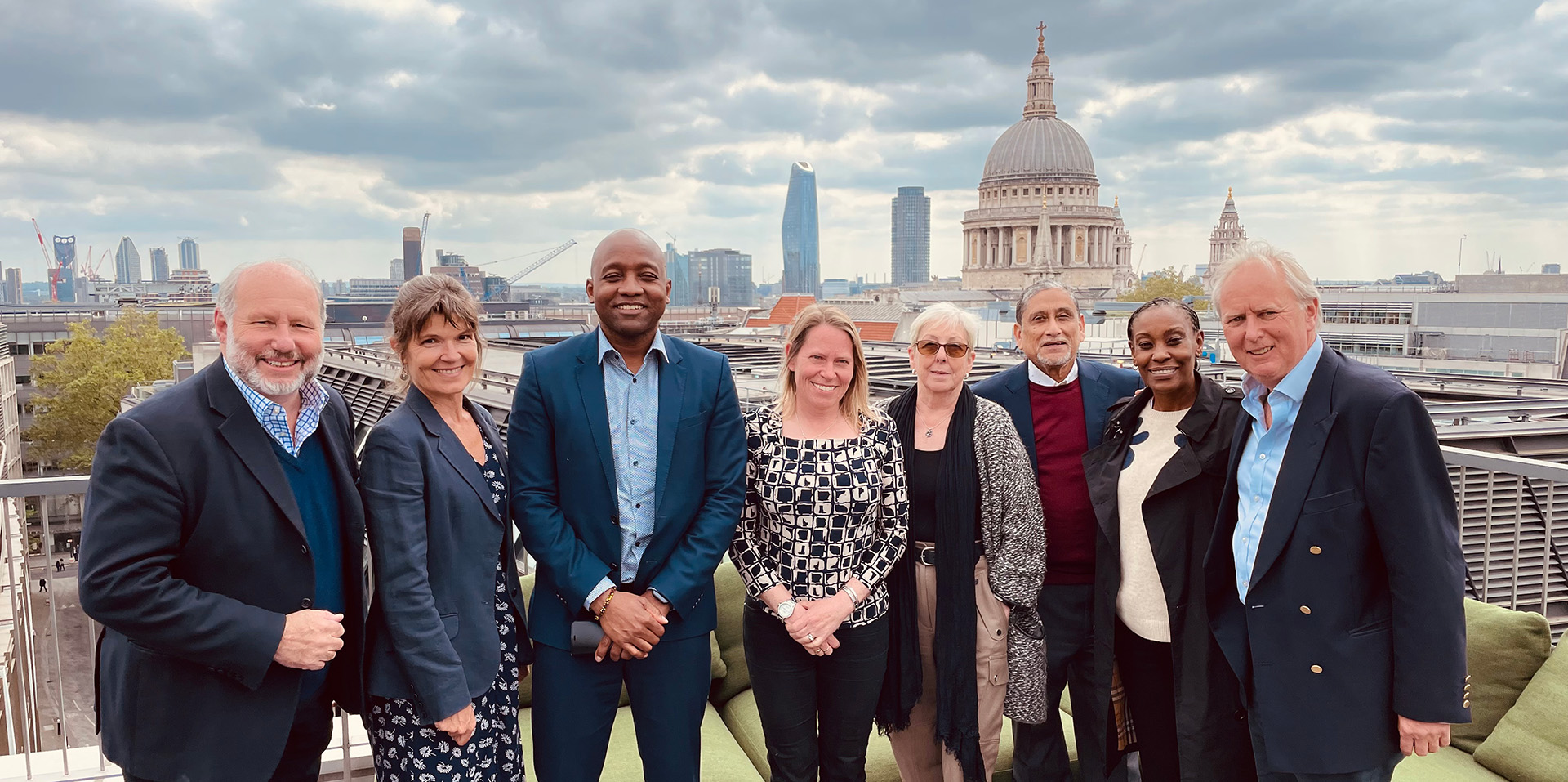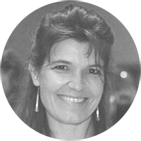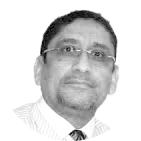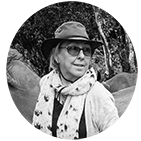OUR TUSK AWARD JUDGES
Our judging panel features some of the leading conservation figures working in Africa today. They are all experts in their fields, with a deep understanding of the challenges and opportunities of African conservationists

The judges of the 2023 Tusk Conservation Awards. (LtoR) Nigel Winser, Susan Canney, Maxwell Gomera, Amy Dickman, Mary Rice, Ali Kaka, Beatrice W. Karanja, Charlie Mayhew.

Dr Susan Canney
Susan Canney is the Director of the Mali Elephant Project, having worked on a variety of nature conservation projects across Africa, Asia, and Europe
She also worked as a research officer for the UK Government’s independent adviser on sustainable development at the Green College Centre for Environmental Policy & Understanding.
Her chief interest is how to bring ecological literacy to human decision-making so that our actions are guided by the right relationship to the planet. As a result, her work involves using systems perspectives and collaborative approaches to understand the human-nature relationship and find sustainable solutions to the co-existence thereof.
She is a Research Associate of the Department of Zoology, Oxford University, a Trustee of Tusk, a member of the Sahara Conservation Fund’s Science Committee, a member of the IUCN African Elephant Specialist Group, and has co-authored a book on “Conservation” for Cambridge University Press.

Amy Dickman – Tusk Award Alumni Judge
Amy Dickman is a Professor of Wildlife Conservation at Oxford University and Director of the university’s Wildlife Conservation Research Unit. She has worked in conservation for over 25 years, with a particular focus on understanding and improving human-wildlife coexistence, especially in East Africa. She is the Joint CEO of Lion Landscapes, which develops effective community-based conservation initiatives in Kenya, Zambia, Tanzania, and beyond. She is also Chair of the Board of the Arabian Leopard Fund.
Amy is on the IUCN’s Cat Specialist Group, Human-Wildlife Conflict Specialist Group, and Sustainable Use and Livelihoods Specialist Group. She has published over 100 scientific papers and book chapters on conservation and is an award-winning conservationist, including being a finalist for the Tusk Conservation Award.
As a mother of two young children, she is also passionate about the role of women in science, and empowering others to be as effective and happy as they can be in conservation.

Maxwell Gomera
Maxwell Gomera is the director of the Biodiversity and Ecosystems Services Branch of the United Nations Environment Program. Maxwell is a resource economist with extensive experience in nature conservation, agricultural development, commercialization of natural products, and people and nature issues.
As part of his studies, Maxwell developed bioeconomic models for the management of elephants. He has worked extensively with governments and corporates from across the world. Max was part of the UN Environment team that developed a “Global Green New Deal” for reviving the global economy and boosting employment while simultaneously accelerating the fight against climate change, environmental degradation, and poverty – in response to the financial and economic crisis of 2008.
Max writes for many mainstream newspapers and media – and is widely published. He sits on many Boards and has worked extensively with institutions globally on a range of issues, including tourism development, human rights and wildlife management.

Ali Kaka
Ali studied at the University of Colorado (Boulder) and Colorado State University, Fort Collins in the USA, majoring in Biology/Zoology and Captive Wildlife Management.
In 1977, he joined the Kenya Wildlife Services as a Research Assistant and later earned the title of Senior Assistant Director. In 1998 Ali was awarded the Kenya Order of the Grand Warrior for achievements in anti-poaching, rhino capture, and intelligence work. In 2001 Ali joined the East African Wild Life Society (EAWLS) as the Executive Director.
From 2009 to present, Ali has worked with the IUCN as the Regional Director for Eastern and Southern Africa. Ali also served as Vice Chair of IUCN-WCPA Eastern Africa, served on a number of local Conservancy Boards, and as a member of Kenya Ministerial Advisory Committees.
In 2004 Ali received the National Geographic Society’s Howard Buffet Award for ‘Leadership in African Conservation’ and the Meritorious award from IUCN – WCPA in 2009.

Beatrice W. Karanja
Beatrice is a conservation philanthropist and a communications specialist with over 25 years of experience covering the African continent as both as journalist for BBC and Reuters and as a communications professional with UNICEF, Oxfam, and the African Wildlife Foundation.
As a PR professional at Portland Communications, she had the opportunity to consult for Mo Ibrahim Foundation, Kofi Annan Foundation, and the Bill & Melinda Gates Foundation. With roots in Kenya and Uganda, Beatrice continually strives to build strong partnerships that address the balance between Africa’s development and its conservation priorities.
Beatrice is a Board representative of Mara Elephant Project (Chair). She also sits on the board of Tusk and is one of the inaugural board members of Natural State. She holds a BA in Communications, from Duquesne University, Pittsburgh Pennsylvania, USA and currently undertaking a Post Graduate Diploma at the University of London, School of Oriental and African Studies (SOAS).

Charlie Mayhew OBE
Charlie Mayhew began his working life in 1981 as a Marine Insurance Broker at Lloyds of London with Dumas Ltd. In 1984 he persuaded Willis Faber to sponsor him to organize a major expedition across Africa as part of the UN’s International Year of Youth. After 18 months of planning, the 33-strong team led by Charlie departed London for Africa.
Upon his return, he was elected a Fellow of The Royal Geographical Society and made a member of the Scientific Exploration Society. In 1990 Charlie co-founded Tusk Trust with the actor Timothy Ackroyd. They co-produced the feature film ‘Lost in Africa’, a drama highlighting the horrors of the ivory trade. In 2002, Charlie stepped down as a Trustee to become Tusk’s first Chief Executive. In recognition of his services to conservation in Africa, Charlie was awarded an OBE by His Majesty The King in June 2023.

Mary Rice
Mary Rice is the Executive Director of the Environmental Investigation Agency (EIA) in the UK. EIA investigates and campaigns against a wide range of environmental crimes and abuses.
Trained as a journalist, Mary spent 15 years working in Asia before moving to London and into the environmental sector. With more than two decades of experience in this field, Mary has extensive knowledge of the illegal international trade in wildlife, specifically ivory. The findings of EIA’s global investigations into the illegal trade in ivory played a key role in establishing the international ivory ban in 1989.
Mary is a fellow of the Royal Society of Arts and a published author and photographer. Heat, Dust and Dreams (Struik) was the result of three years of research and photography in what is now known as the Kunene region, home to the last viable population of black rhino outside a protected area.

Nigel Winser
Nigel joined Earthwatch in July 2005 and was appointed Executive Vice President in 2008. Prior to that, he was the Deputy Director and Head of the Expeditions and Fieldwork Division at the Royal Geographical Society in London.
For his services to fieldwork, notably in Oman, he was awarded the Patron’s Gold Medal of the Society in 1988 and the Mungo Park Award of the Royal Scottish Geographical Society. Nigel has been on the board of several bodies, including the IUCN UK committee, the UK Man and the Biosphere committee, the Mount Everest Foundation, the British Airways Tourism for Tomorrow committee, Friends of Conservation (Chair), the Field Studies Council and the Global Canopy Programme.
Nigel’s principal expertise lies in interdisciplinary and international purpose-led fieldwork, community-based nature conservation, and corporate engagement with environmental issues. Nigel was awarded an honorary degree of Doctor of Science from Westminster University for his services to the environment and conservation.
